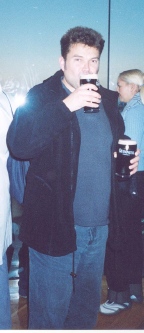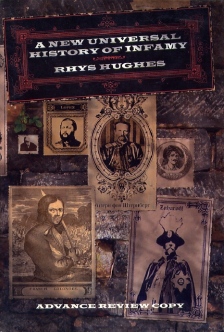|
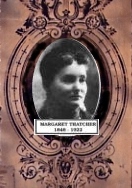
|
|
| M.
Thatcher |
Tastes of Blackness
Since the start of the world there have been three main types of
darkness: (1) Cimmerian Darkness, from between the years when the
ocean drank Atlantis and the years of the rise of the sons of Aryas
, which can only be cut by barbarian swords and barbarian mirth,
(2) the Heart of Darkness, invented in Belgium for export and still
used to flavour pralines and other expensive chocolates, (3) the
Hair of Darkness, glimpsed in a vision by the blasphemous prophet
Hakim Mokanna and described as belonging to a terrible demoness
or usurped goddess seated on an uncomfortable throne in a roofless
house at the centre of a distant island who visibly sagged under
the weight of her impossible organic crown, a cone of grotesque
flaxen locks that towered into the sky and actually touched a point
of the firmament directly opposite the position of the sun on the
far side of the world. Hakim gasped and the image vanished and
not even his most devout followers, those who accepted that revulsion
was a cardinal virtue, attributed any importance to such a ridiculously
vile apparition. Whatever the intensity, whether thick glooms or
thin twilights or moderate dusks, whether they occasion blinking
or groping, like certain ladies, chiefly of the night, sometimes
of the morning, all other kinds of darkness are merely variations
on this Trinity of Murks.
Gross Conception
At the precise instant that the Spanish engineer Juan de la Cierva
was conducting the maiden flight of his first autogyro, a child
was conceived in the drab industrial town of Grantham, England.
The gestation and delivery were hard and unnaturally long for the
mother. The father was a grocer notorious for selling the oldest
vegetables in the region and a rumour soon began to be circulated
that even the fruit of his loins was outdated and rotten. The parents
chose to name the baby Margaret and could not explain why. On the
night of the autumn equinox 1926, a gigantic explosion shook the
chimneypots of Grantham’s houses, for a chemical plant had
caught fire on the outskirts, sending a vast cloud of sulphur dioxide
drifting over the town. In order to alleviate the stink of his
putrefying stock, the grocer had already thrown wide every door
and window in his shop and remained unaware that his sleeping daughter
upstairs was gulping in enormous quantities of the sulphurous gas.
In the morning he found her half dead in her cot, the whites of
her eyes permanently stained a rancid yellow, her tongue bloated
and horrible, her hands twisted into claws. But sulphur is good
for the skin and after she recovered, her scalp never itched, no
matter how inhuman her subsequent hairstyles. Also she developed
an early interest in chemistry.
The Oxford Test-Tube
The altered child had no wish to remain in her home town and work
behind the counter in her father’s miserable shop taking
money from senile customers and giving the withered produce of
poisoned allotments in exchange. In her opinion, the only counters
worth her time were counter-revolutions, though her political ideas
were far from being formed at this early stage. In class she was
a mediocre pupil, but in her spare time, while other children played
with balls and dolls, she experimented in the privacy of her bedroom
with chemicals stolen from school. The ceilings of Number 2, North
Parade, Grantham, still bear the blotches of her enigmatic research,
although the building itself has now been converted into a restaurant
and guest house. What she was trying to achieve by mixing sulphuric
and nitric acids with glycerine in flasks immersed in bowls of
ice is still uncertain. Her later claim that she was attempting
to synthesise and stockpile vast quantities of hair dye is dubious
but cannot be entirely discounted. She eventually passed enough
exams with high enough grades to win a place at Oxford University.
At Oxford she was an unremarkable student, but in her spare time, while other
undergraduates played with punting, cocaine and fornication, she remained alone
behind a locked door reading the political philosophy of such thinkers as Edmund
Burke, Count Gobineau and Houston Stewart Chamberlain. She cultivated no friends
and attended no parties but one of her lecturers claimed she once confided in
him an interest in applying the rules of chemistry to society, a notion at which
he sneered, causing her to withdraw even more deeply into her own world. It was
the beginning of the Cold War, tensions between the liberal democracies of the
West and the New Empire of Russia were constantly increasing, helicopters and
other rotating-wing aircraft filled a sky already sleepily pricked by a thousand
dreaming towers. At night, after the blood of sunset had dripped all away over
the table-edge of the horizon, she stalked the corridors of her college, her
shadow on the far wall magnified by the thin rays of light coming from the keyholes
of occupied rooms, her silhouette crouched and leering with outstretched talons,
but half its height taken up by the penumbra of her hairdo. Frustrated, she was
trying to menace the laughter, tinkle of glasses and bed squeakings of her normal
neighbours.
Research, Revulsion and Taxes
|
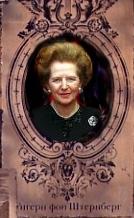
|
M.
Hatcher.
|
In 1947, having received her degree, the future Prime Minister of Great Britain
embarked on a course of postgraduate work and study, specialising in stabilising
volatile compounds to enable them to be transported more effectively. She applied
herself with relish to this task for almost four years until an overheard conversation
between the directors of the laboratory revealed to her the nature of what she
had never thought to ask, namely the ultimate purpose of her research. The volatile
compounds in question were medicines, not toxins or explosives, and the aim of
stabilising them was to ensure they might be carried long distances by motorbikes
or helicopters without damage. A mere prototype herself, Thatcher promptly resigned
and looked for an alternative career. She found one as a tax lawyer.
She became an expert at exploiting loopholes in the existing legislation, helping
certain firms and individuals avoid paying tax at the expense of other firms
and individuals. She particularly favoured the manufacturers of weapons and pesticides,
tobacco companies and the largest supermarket chains, and enjoyed penalising
anything ethical or aesthetic. Her blood still contained particles of sulphur.
A mysterious group of anonymous economists granted her an unknown prize in a
secret ceremony at an undisclosed location but she was never made aware of it.
Somehow she succeeded in encouraging a rewrite of the law so that helicopters
used for humanitarian purposes had to pay extra tax while those used by the military
became exempt from paying anything at all. One unexpected consequence of this
action was an interest among engineers in developing variations on single sets
of rotors to create machines that might not be defined as helicopters. The manufacturers
of humanitarian helicopters were forced to pursue these projects through penury,
the manufacturers of military helicopters did so because they could now afford
to innovate. A second unknown prize was granted in circumstances possibly similar
to the first.
Successful but curiously dissatisfied, the still fledgling Thatcher determined
to enjoy a more active social life. She wandered the streets of London, the ‘Big
Smoke’ in contemporary parlance, through the thick fogs, but looked in
vain for nightlife, chancing only on strange establishments where people convulsed
their bodies to sounds and ingested fermented sugars in liquid form with formulae
she knew. She passed on. Eventually she discovered a nightclub and entered the
open door, feeling at home immediately and realising that not only was a social
life possible even for her but easy. She entered a chamber where people were
sitting facing a stage on which stood a very old man. He was mumbling something
about free trade, selective franchise, minority rule and the perennial justice
of the status quo. How she enjoyed herself among these ravers! That night she
became an official member of the Conservative Party and a year later the wife
of another regular attendee at every meeting of the party, a rich drunkard and
gambler named after a common model of fire engine. Dennis provided the wealth
for her eternally grasping hands and she numbed his hangovers by shouting, a
mutually beneficial, if totally horrific, symbiosis. The marriage ceremony may
also have been secret and unknown. Nobody can say for sure.
House of Abnormal Commons
|
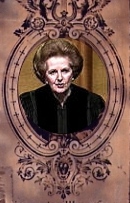
|
|
| M.
Hatchet |
Helicopters come and go but Thatcher remained in one place, at the heart of conservatism,
a Member of Parliament and a shrieking crone on the backbenches at Westminster,
her hair piled higher than ever, her jowls juddering incessantly, the wrinkles
on her neck multiplying daily. Her yellow eyes sickly flickered like living kidney
stones. The first satellites were being launched into orbit by Russia and her
agitation at not being able to simply reach up and pluck these instruments of
deceit from the very heavens was palpable. Thoughts of outer space chilled the
vacuum in her soul.
Despite her ambition and her husband’s wealth, her rise through the ranks
was slow, slower than the decay of a preserved cadaver, at least as slow as the
healing of a trade unionist mangled by faulty machinery, but perhaps not quite
as slow as the evolution of the pig. The benches of Parliament creaked timidly
under her greasy buttocks. Ten years as a minor figure in politics enraged her
senses, invoked her ire and gave her an abiding hatred for the word ‘minor’ however
it was spelled. Much later she would come to hate the word ‘major’ also,
but by that time it was too late. As she grew ineffectually older, her hair continued
to mount higher on her head until the weight began to deform her skull, the pressure
forcing her bulging eyes to point in different directions, giving the illusion
they could watch everything at once.
Finally in 1970, after waiting more than a decade, she was promoted to the rank
of Minister of Education and Science. That year there was no summer.
Udder Considerations
It must not be supposed that Margaret Thatcher possessed no sense of fun. She
laughed for a week when England launched its own first satellite and commissioned
a group of early electronic musicians to compose a piece as a tribute to this
achievement. Named after the satellite itself, ‘Telestar’ became
a moderate hit for sonic experimentalist Joe Meek. Had it only been a minor hit
she would have arranged his assassination. As it was, Meek committed suicide
in despair at what he had done, inheriting neither the earth nor the royalties
from his tune. Another escapade was the rustling of a herd of cows with a handful
of loyal followers during the darkness of a powercut, an adventure which earned
her the nickname ‘Thatcher the Milk Snatcher’. She also enjoyed squatting
on rotting vegetables.
The Blasted Heath
The defeat of the Conservative Party in the general elections of 1974 sent shockwaves
through the secret clubs of economists and manipulators who pulled, or imagined
they pulled, the hidden strings of government. With the disgrace of Prime Minister
Edward Heath and his expulsion from the walnut and teak corridors of power, they
needed a substitute champion, or replacement puppet. Thatcher, so to speak, was
their man. They encouraged her to announce her intention to apply for leadership
of the party and following a phoney secret ballot she won the post in 1975. At
this time, with the aid of her mysterious friends, she embarked on a program
of image management, learning how to lower her voice an octave, improving her
posture by reducing the weight on her skeleton by secreting miniature helium
balloons in her hairdo and adopting a handbag as a mascot, the contents of which
have still never been authenticated .
Across a landscape decimated by civil unrest, strikes, energy deficits, congealed
rubbish, crumbling housing estates, rusty factories, hideous pop groups, ships
stranded on hillocks, huge rats, radioactive rivers, cardboard boxes, rancid
butter mountains, colleges without doors or windows, queues of starving immigrants,
congested hospitals, empty libraries, deformed policemen, bruised wives, shallow
graves, chopper bicycles and allotments littered with the limbs of plastic dolls
and half burned pages of laminated pornographic magazines, Thatcher trundled
in her private train, the roof bristling with anti-aircraft guns and sentries
with binoculars watching out for helicopters. It was inevitable the Conservatives
would win the next election. Her dominance was assured. Her megaphoned cries
of evil joy burst the eardrums of rabbits and yokels in the passing fields and
villages.
Ships That Pass in the Night…
Having secured the support of the middle classes by various crude or subtle measures,
Thatcher won a landslide victory in the general elections of 1979 and celebrated
in style by arranging a real landslide in a Welsh valley with a form of dynamite
she invented herself, burying an entire school full of children under a million
metric tonnes of rubble. Certain regions of her new kingdom proved to be more
troublesome than others. These regions all had one thing in common: they were
areas where miners lived and worked. She already loathed this word but who were
miners and what did they do? Thatcher decided to investigate and came away horrified.
These miners were people who dug up inflammable black stones from the bowels
of the earth, drilling down ever deeper in their quest for the magic lumps, approaching
dangerously close to the infernal regions, which she regarded as her personal
territory. “Not over my backyard!” she roared as she vowed to destroy
the mining industry. One morning without realising it, she met the King of the
Miners in the street, both blown along by their personal ill-winds, filling the
open coats of the other as they passed like the frightful sails of plague ships.
… and get Blown to Bits
Before war could be declared on the miners, Thatcher found it necessary to practise
on a distant country. The foolish Argentinian dictator, General Galtieri, assuming
that because the British leader was a woman she would fight guns with flowers,
sent an army of boys in watertight boots to occupy the Sebald Islands, a Dutch
possession in the South Atlantic claimed under different names by both Britain
and Argentina. For Thatcher the invasion was a superb opportunity to increase
her prestige and make money. Factories churned out bombs and shells containing
propellants and charges on which she held the patents. The British fleet steamed
south, each ship packed to the brim with sailors, soldiers, missiles, hunting
dogs and jet aircraft. Only helicopters were not permitted to enter the conflict.
After a British submarine sank the largest Argentinian ship, the Yerba Mate,
General Galtieri surrendered and committed himself to a lunatic asylum. The great
writer Jorge Luis Borges compared the war to “two bald men arguing over
a comb.” The massive hairstyle of Thatcher cast an oily shadow over this
comment as she ordered the burning of his books in revenge. On the Sebald Islands
charred sheep cooled slowly.
Feverish with bloodlust, Thatcher turned her attention to the miners and within
a year had annihilated them. Arthur, King of the Miners, also known as the ‘Once
and Future Striker’, offered to switch sides just before the end. Thatcher
welcomed him with open arms and invited him to her private residence, a mansion
with gardens in which all the plants were only black or white, like moral questions.
When Arthur arrived at ‘Checkers’ he was met by Thatcher herself
who led him up flights of steps to the flat roof of the building. There was a
magnificent view of boring England. Arthur bowed down before her and Thatcher
drew a sword from a scabbard which hung at her waist. The King of the Miners
was knighted with a single stroke, his unbelieving head rolling to the edge of
the roof and falling onto the patio far below, shattering like the eggs which
formed the major part of the diet of his betrayed followers. Thatcher sheathed
the sword without wiping it. She had commissioned the weapon from a master swordsmith
in Sheffield, a town not far behind Damascus and Toledo in its reputation for
the excellence and durability of its sharpened steel. In a moment of pomposity
, she had named this weapon the ‘Sword of Truth’. Once drawn it could
only be sheathed after an outrageous lie had been told.
It was with this sword that Thatcher encouraged her husband Dennis to dance frantically
about a hotel room in Brighton during the Conservative Party conference of 1984,
using it to beat time on the furniture, poking his shadow on the walls, conducting
a wild but silent melody which deafened the drunken man and sent him reeling
in circles while they both laughed hysterically in the mirror above the bed.
This performance was interrupted by an enormous explosion. The Irish Republican
Army, known in their own language as the Feigned Shin, had planted a bomb in
the hotel, hoping to wipe out the entire government. The plot was a failure.
In the steaming rubble Thatcher sneered defiance at her enemies, a single tiny
bruise above her left eye scintillating in the flashing lights of the ambulances,
police vehicles and fire engines. Janitors came to mop the blood of insignificant
conservatives. Then Thatcher sheathed the ‘Sword of Truth’. Everyone
blinked. It seemed that the explosion had never happened, that it had been nothing
but an outrageous lie.
Sayings of Thatcher: a Selection
(1) “There is no such thing as a molecule: there are only individual atoms.”
(2) “Homeless people are those you step over on the way to the opera.”
(3) “Nobody would remember the Good Samaritan if he had only had good intentions.
He also owned a large business and traded weapons across the border.”
(4) “In politics, if you want anything said, ask a man. If you want anything
done, ask a woman. If you want anything illegal, ask Jeffery Archer.”
(5) “The Pole Tax will be a vote winner.”
(6) “This lady is not for turning or any other form of rotational manipulation.”
(7) “Read my lips: new taxes for deaf people!”
(8) “I am a very friendly person. I know dictators all over the world.”
The Pole Tax Riots
|
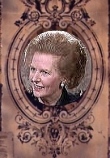
|
N.
Ratchet.
|
In her final years of power, Thatcher devoted her time to inventing cruel new
taxes to harass and depress the people. She began charging homeless citizens
rent for using the sky as a roof to sleep under. But her grandest scheme was
the cutting down of the famous Sherwood Forest in Hampshire to make a sharpened
pole for every inhabitant of her country. The Pole Tax was an amazingly simple
concept. All men, women and children, regardless of age, financial circumstances
or mental capacity, were required to pay a monthly sum of Fifty Guineas or else
be decapitated and have their heads impaled on the pole that bore their name.
Riots erupted in the streets, students and office workers and shopkeepers running
up and down the twisting alleyways of London, over the monumental bridges, banging
drums and firing rocket propelled grenades at policemen and judges. Thatcher
watched impassively from a window. Dennis remained loyal but the other members
of the Conservative Party turned against her one at a time. Finally a leadership
challenge was launched. The secret group of economists who pulled the strings
had decided to abandon her. Tears in her eyes, she resigned rather than lose
face. Her real face had already lost all resemblance to a human visage and that
was enough.
The man who replaced her, John Major, led the Conservative Party to another victory
in the following General Elections, but the party was never as strong as it had
been under Thatcher. Despite his iron grey hair and cold square spectacles, Major
was ultimately a feeble autocrat. He had little interest in poison gas. His brother
was a leading authority on the subject of garden gnomes. Coincidentally, it was
rumoured that the Lord of Gnomes had a brother who collected models of British
Prime Ministers. Major occasionally went to ‘Checkers’ to visit Thatcher
but these trips became more and more infrequent. She had slumped into a deep
armchair and deeper depression, her hairstyle now so tall and heavy it had to
be supported from the ceiling by chains. The ceiling already sagged under the
strain, plaster flaking down on the carpet like the dandruff of a senile mammoth.
Her Final Winter
Thatcher lingered in this world for another decade, spending her last year in
bed, propped up on pillows. The ceiling had completely collapsed around her and
as she rolled her eyes up to the open sky she dimly wondered if this exposure
to nature defined her as homeless. From outside, a passing walker might squint
at what seemed to be an enormous bush sprouting from the centre of a ruined house.
Dennis had long since vanished into one of the numerous taverns which lurk in
every corner of rural England. She never saw him again. When she died, something
extraordinary happened, something almost predicted by the prophet Hakim Mokanna
all those centuries before. Her hairstyle detached itself from her scalp and
floated up into the sky, blocking the sun like a monstrously diabolical cloud.
A chilly darkness spread across the land. Crops failed and people starved. Finally
an enterprising pilot flew a helicopter with contra-rotating blades into the
middle of the aerial hairstyle, cutting it away like a barber of justice. Sunlight
was restored but the millions of tiny hairs which fell to earth were blown around
the world and stuck in the eyes and hearts of innocent people, causing them to
see and feel everything in free market terms.
|
|
